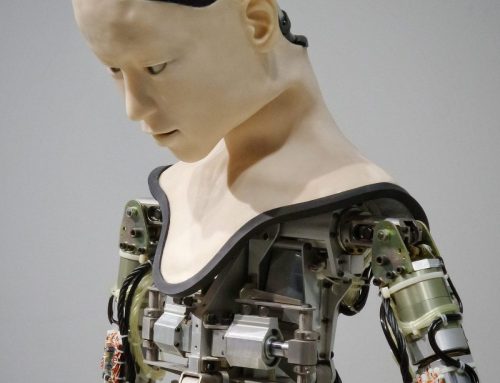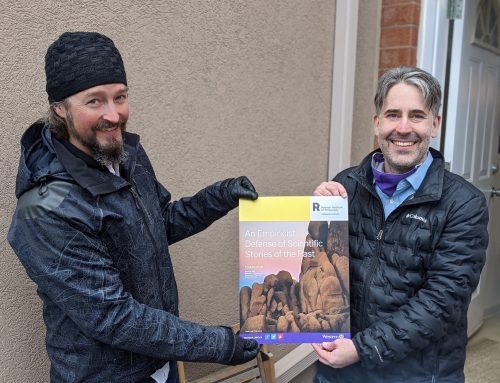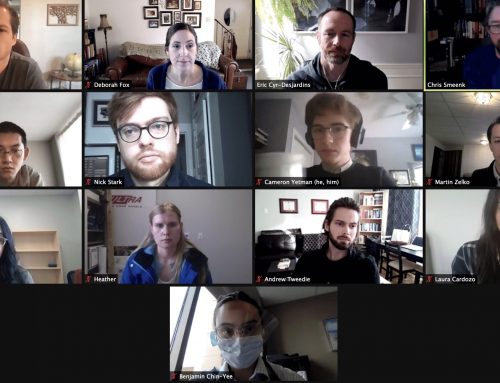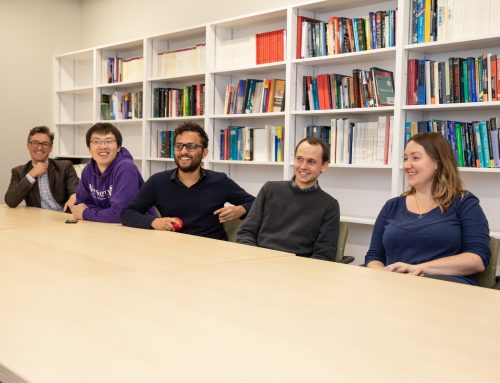This project began as an exploration of the possible connections between Raja’s theory of resonance (Raja 2018, 2019, 2021) and James’s theory of selectivity in consciousness (James 1890). Resonance involves the direct coupling of neural activity in the organism with the detected ecological information which specifies the overall dynamics of the organism-environment system. Whereas selectivity has to do with guiding action through the preference of some sensations over others. The plan was to investigate whether selectivity might play a role in determining which information organisms intentionally act so as to detect and resonate with. In turn, this might help to explain how resonance contributes to higher order cognition.
After reading extensive selections of James’ The Principles of Psychology, as well as Raja’s work on resonance theory, and discussing these things with Michael Anderson and Vicente Raja, Bakker concluded that it is more likely that our selection of actions arises through an ever-developing physiological predilection to resonate more to certain kinds of organism-environment dynamics over others. Thus, selectivity does not seem to direct resonance so much as resonance seems to direct selectivity. Moving forward, Bakker hopes to draw from both James’ theory of habits, and the study of habitats in ecological psychology (Heft 2001) to investigate whether habits form as a result of organisms repeatedly resonating with the same kinds of information within relatively stable habitats. In turn, his plan is to implement this research into his broader thesis, in which he strives to give an account of how cross-modal effects in perception might have evolved in virtue of habit formation within habitats.
Under the supervision of Dr. Carolyn McLeod, Clair completed research in support of a SSHRC Insight Grant application for an interdisciplinary project focused on institutional distrust. The project itself aims to develop a conceptual foundation for understanding and responding to chronic distrust in public institutions that is rooted in systemic injustice. More specifically, it aims to conceptualize distrust in terms of the ongoing Othering that marginalized groups experience in their encounters with public institutions. This view constitutes part of a novel, unified account of distrust and trust (conceptualized by contrast in terms of belonging) that draws on research from philosophy and the social sciences.
In support of this project, Clair’s role included substantial interdisciplinary research on topics such as belonging, Othering, and distrust, as well as organizing project references and reviewing application materials. The primary outcome of this work was a SSHRC Insight Grant application, with the intention for Dr. McLeod to develop a scholarly monograph as well as a series of articles and conference presentations with collaborators from philosophy and the social sciences. The goals of these contributions will be to broaden our understanding of trust and distrust, taking seriously how marginalized people experience them, and to recommend strategies for responding to their chronic distrust in institutions such as child welfare and health care.
Recently, philosophers of science have begun to reconsider the question of how machine learning (ML) might advance scientific discovery and understanding. One aspect of this work is to analyze what it means to say that an ML strategy leads to a ‘novel’ discovery. In this project, Champion investigates the role that existing theory plays at each stage of an ML pipeline. She introduces three different types of novelty and discuss how various choices made at each stage impact them. Her conceptual framework will help to highlight interesting paths to ‘strong’ novelty that have so far been underappreciated by philosophers of science.
Funding for this work has enabled her to develop a paper, present at PhilML 2022, and refine the goals of her doctoral thesis.
Mental health content online has led to an increase in non-experts using technical psychiatric terms. This project sought to determine how members of online communities use technical psychiatric language and if, when they misuse a concept, they can significantly revise its definition. This project used Ian Hacking’s Looping Effect—that psychological labels can be redefined by the people labelled with them—to explore how the term “object permanence”—a developmental stage where infants become aware that non-visible objects still exist—became known as a deficit of attention- deficit/hyperactive disorder through TikTok videos. It was argued that TikTok users label themselves as having object permanence deficits and, in turn, revise its meaning.
Initial research of the causal story for psychiatric concepts on TikTok led to conversations with the non-expert TikTok users who create and engage with psychiatric content on the platform. A semi-structured interview was developed, and an application to conduct empirical research was submitted for review to the research ethics board in July. It was approved later that month. Interviews began in August and are ongoing. Several users were interviewed about their experience of ADHD on TikTok, and preliminary themes emerged from those interviews that corroborate philosophical theories of concept creation. An abstract for a poster was accepted for the Philosophy of Science Association conference, and it will be presented in November 2022.
This project contributes to the literature on “algorithmic injustice” by arguing that algorithms on social media can damage relations of political solidarity. By targeting us with content likely to affirm our biases and beliefs, algorithms reinforce our own epistemological constructions of the world. This makes it easier to unintentionally engage in what Mariana Ortega calls “knowing, loving ignorance” which (despite the name) is not actually loving, but is arrogant perception guised in proclamations of love and understanding. Drawing a comparison between “knowing, loving ignorance” and “performative allyship”, Cichocki argues that we ought to heed Ortega’s warnings as we work towards building meaningful solidarity in the “digital age”.
Cichocki surveyed the philosophical literature on algorithmic injustice and online activism, which allowed her to situate her project within the literature and draw from existing research. After presenting this project at the CPA, Cichocki was able to use the valuable feedback received to further hone her thesis and supporting arguments. Cichocki produced a draft which will constitute a chapter of her dissertation and will also be developed as a stand-alone article to be submitted to a peer-reviewed academic journal. Additionally, the research for this project has fruitfully overlapped with and contributed to a co-written project for an Interdisciplinary Development Initiative (IDI) on artificial intelligence and social justice.
Mechanistic explanation has been one of the prominent philosophical frameworks for thinking about the nature of explanation in the mind-brain sciences, while the explanatory power of dynamical systems or network models remains controversial. The aim of this project was to use emotion research as a basis for evaluating the explanatory power of network models, because current attempts to find brain mechanisms for emotion have revolved around the idea that it requires a dynamical systems approach. The project anticipated that the continuing failure to find brain mechanisms for emotions points to the need to better clarify what distinguishes mechanistic explanations from network explanations.
One outcome of the project is an argument in support of the idea that network models provide an entirely new kind of explanation that is different from standard mechanistic explanations insofar as they emphasize the reciprocal relationship that exists between component parts of a system. Such explanations thus redefine the components of a system as interacting in a way that cannot be explained in terms of a linear and causal mechanism. The project has yielded three outcomes. In an initial step, Kucuk presented her work “Representationalism about Moods: In Defense of the Hybrid View” at the Atlantic Region Philosophers ’Association (ARPA) Meeting at Dalhousie University, Halifax, Nova Scotia, on October 14th. Next, Kucuk will present a poster titled as “The New Framework for Emotion Research: Lessons from the Mechanistic Debate” at the bi-annual Philosophy of Science Association Conference which will be held in November 9-13 in Pittsburgh, USA. Finally, Kucuk is working on a draft of an article which will be informed by feedback from this poster presentation.
There is growing philosophical interest in understanding patient perspectives in psychiatry. What kinds of perspectives are worthwhile to consider in clinical contexts? What is the epistemic merit of patient testimony? Current diagnostic criteria for mental illness, like those found in the Diagnostic and Statistical Manual of Mental Disorders (DSM-5), have been shaped predominantly by the perspectives of clinicians while excluding patients’ own perspectives on their phenomenological experiences of living with mental illness. The aim of the project is to assess what is meant by patient perspectives as well as how patient perspectives can be accessed and integrated in order to better understand mental disorders and their pathogenesis.
The research project involved the creation of a semi-structured interview to better grasp patient perspectives on Anorexia. This work is done in collaboration with Sarah Arnaud, Jacqueline Sullivan, Lindsay Bodell and her research team, to develop a testable model to assess the roles of emotions and interoception in persons with Anorexia, with a co-authored paper that will be submitted to The Review of Philosophy and Psychology.
Project Description:
1. “Classic Psychedelics (CPs) in Translational Research: Addressing Epistemic Challenges from Bench to Bedside:” Review of research on CPs for depression, articulating challenges scientists face in both human and rodent research, with a positive proposal for advancing the translation of psychedelics into viable treatments for psychiatric disorders.
2. “Psychedelic Psychiatry & Philosophy of Science:” Implications of psychedelic evidence on issues in philosophy of psychiatry from the perspective of philosophy of science.
3. “The Head-twitch Response in Mice as a Measure of Human Psychedelic Potential: A Study of Construct Validity:” Analysis of a behavioral test in mechanistic studies of CPs using construct validity as a heuristic.
The first project is co-authored with her supervisor, Dr. Jacqueline Sullivan. It has been commissioned for a (forthcoming) volume on Philosophical Perspectives on the Psychedelic Renaissance by Oxford University Press, edited by Dr. Letheby and Dr. Philip Gerrans. The second project is in the form of a lecture. Mattu accepted an invitation from the MIND Foundation to present some of her research as a part of their “MIND Philosophy Series.” In this lecture she discussed current research on classic psychedelics in psychiatry and the implications that evidence from this research has on philosophical issues within psychiatry from the perspective of philosophy of science. The third project is a historical and philosophical analysis of the development and use of a rodent behavioral test that is highly utilized in studies investigating the mechanisms by which classic psychedelics work in the brain. This project is in the form of a poster. It has been accepted to be presented at the Bi-annual Philosophy of Science Association Conference, taking place November 10th – 13th, 2022, in Pittsburgh, PA.
This project seeks to examine the history of the Bioethics Department at The Hospital for Sick Children, Toronto, Canada. The project will present the chronology of this leading Canadian body juxtaposed against the historical backdrop of the evolution of ethical milestones in pediatrics, child rights, and clinical Bioethics more broadly. The moral values that guide and influence Canadian health care are products of historical construction. This project intends to analyze how these moral values were both culturally and historically negotiated over the past three decades in pediatric healthcare.
During the course of the summer, Zoe played a critical role in analyzing primary and secondary source materials within the hospital archives and Bioethics Department at the Hospital for Sick Children (SickKids). She is also leading the writing of an article intended to be submitted to the Canadian Journal of Bioethics. This project is ongoing, given its large scope, and Ritchie continues to provide leadership and support. Zoe presented an Academic Round on the project for the SickKids Bioethics Department in August and is scheduled to present a poster at SickKids Bioethics Week in November. We anticipate a minimum of one publication from this work.
How do we come to know the world? Social scientists have traditionally espoused a neo-Kantian model of human agents: our perceptual experiences are structured by the categories of the society to which we belong. Cognitive social scientists have empirically outfitted this model with the computer model from cognitive science. But what if there are other ways of thinking about our epistemology? Embodied cognitive science has shown how we as embodied beings directly encounter the world without needing to internalize and process cultural categories. This project transactionally investigates the epistemology of human social agents by bringing social scientists, cognitive scientists, and philosophers into productive dialogue with each other.
Ravikumar conducted an extensive literature review across the fields of sociology, anthropology, and cognitive science to grasp how working scientists conceptualize human agency and subjectivity in their explanations of social phenomena. His work in this project has aided him in drafting a doctoral dissertation proposal on the underexplored territory of philosophy of cognitive social science, in which he will explore ontological and epistemological issues in cognitive social science. The transdisciplinary nature of his project brings social scientists, cognitive scientists, and philosophers into productive dialogue. His work has also enabled him to apply for a Rotman Catalyst Grant and prepare a SSHRC Insight Development Grant.






